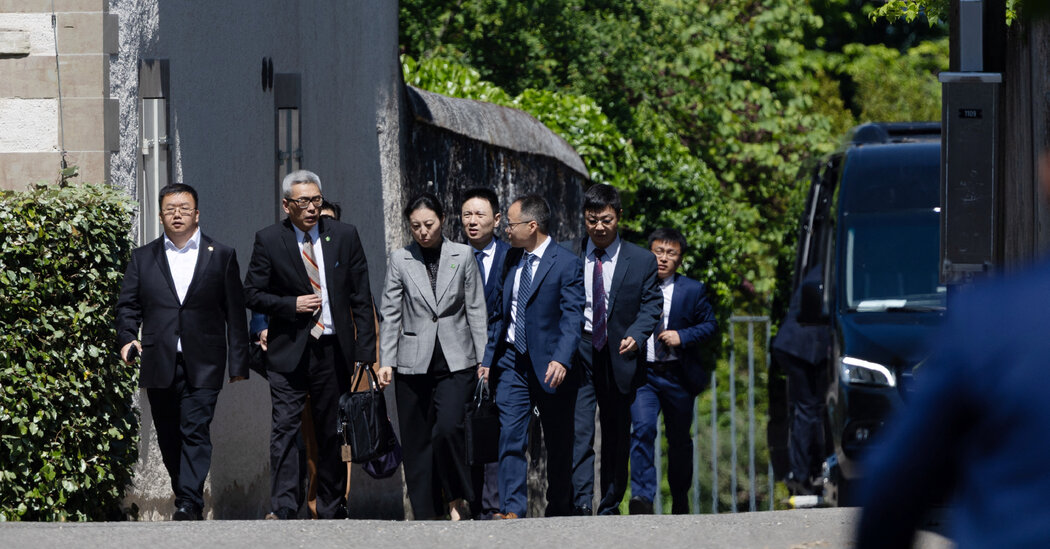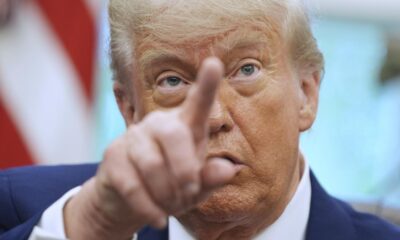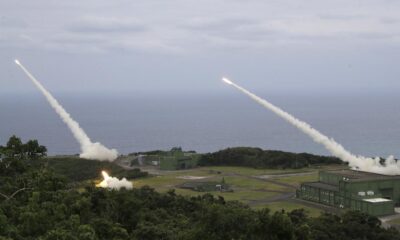Breaking News
U.S. and China Will Meet for Second Day of Trade Talks

Top economic officials from the United States and China are set to meet on Sunday in Geneva for their second day of crucial negotiations, with the goal of easing tensions arising from President Trump’s trade war.
The outcome of these talks carries significant implications for the global economy, which has been shaken by the tariffs imposed by both the United States and China in recent months. President Trump has enforced a minimum tariff of 145 percent on all Chinese imports, while China has retaliated by imposing a 125 percent import tax on American products.
These punitive tariffs are already disrupting global supply chains. American companies are actively seeking alternative sources for products outside of China, while Chinese factories are exploring ways to bypass U.S. tariffs and increase exports to Southeast Asia. Concurrently, many U.S. businesses are contemplating price hikes to mitigate the impact of the tariffs.
Economists have cautioned that the trade dispute could impede global growth and spark inflation, potentially pushing the United States into a recession. These economic concerns have prompted President Trump to pursue a resolution with China.
Following approximately seven hours of discussions on Saturday, the United States announced that no formal statement would be released regarding the talks.
President Trump hailed the initial talks as fruitful.
“A very productive meeting today with China, in Switzerland,” President Trump posted on Truth Social. “Many topics were discussed, agreements were reached. A comprehensive reset negotiated in a friendly yet constructive manner.”
Treasury Secretary Scott Bessent and Jamieson Greer, the United States Trade Representative, are leading the negotiations for Washington, while He Lifeng, China’s vice premier for economic policy, is spearheading the talks for Beijing.
The tariffs have effectively severed trade between the world’s two largest economies.
Ahead of the meetings, President Trump suggested a reduction of tariffs from 145 percent to 80 percent. However, White House spokeswoman Karoline Leavitt stated that China would need to make concessions for the tariffs to be lowered.
The Trump administration has accused China of unfairly subsidizing key sectors of its economy and flooding the global market with inexpensive goods. Additionally, the United States has been urging China to take more aggressive measures to restrict exports of fentanyl precursors, a substance responsible for the deaths of thousands of Americans.
China has consistently maintained that it does not plan to make trade concessions in response to President Trump’s tariffs. Chinese officials have emphasized that the nation agreed to engage in talks at the request of the United States.
The trade discussions over the weekend were intended to lay the groundwork for broader economic negotiations between the two nations. Economists remain skeptical about the likelihood of a swift resolution.
“We believe the key takeaway is to temper expectations for outcomes from the talks between U.S. and Chinese officials this weekend,” remarked Nancy Vanden Houten, U.S. economist at Oxford Economics, in a research note on Saturday.
Ms. Vanden Houten elaborated that even if the United States decreases the tariff rate on Chinese imports to 80 percent, the overall effective tariff rate for imports would still be significantly higher than projections from the time of President Trump’s election.
Nevertheless, President Trump seems prepared to frame any concessions made by China as a victory for the United States.
Reiterating his call for China to open its markets to American companies on Saturday, President Trump proclaimed: “GREAT PROGRESS MADE!!!”
Amy Chang Chien contributed reporting from Taipei, Taiwan.
-

 Destination8 months ago
Destination8 months agoSingapore Airlines CEO set to join board of Air India, BA News, BA
-

 Breaking News10 months ago
Breaking News10 months agoCroatia to reintroduce compulsory military draft as regional tensions soar
-

 Gadgets3 months ago
Gadgets3 months agoSupernatural Season 16 Revival News, Cast, Plot and Release Date
-

 Tech News12 months ago
Tech News12 months agoBangladeshi police agents accused of selling citizens’ personal information on Telegram
-

 Productivity11 months ago
Productivity11 months agoHow Your Contact Center Can Become A Customer Engagement Center
-

 Gadgets3 weeks ago
Gadgets3 weeks agoFallout Season 2 Potential Release Date, Cast, Plot and News
-

 Breaking News10 months ago
Breaking News10 months agoBangladesh crisis: Refaat Ahmed sworn in as Bangladesh’s new chief justice
-

 Toys12 months ago
Toys12 months ago15 of the Best Trike & Tricycles Mums Recommend























